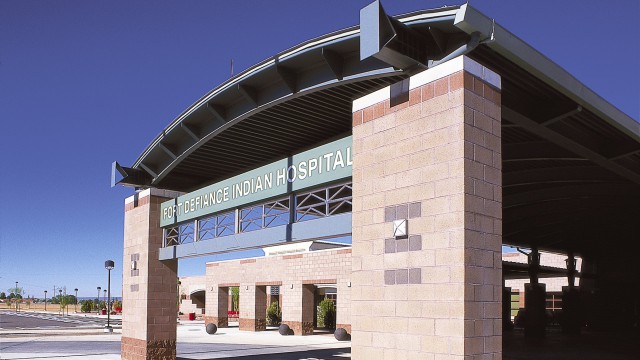By Larry Di Giovanni
Note: This is the third of a four-part series examining the Geisel School of Medicine’s long-standing work with American Indian and Alaska Native communities. Read parts one, two, and four for more.
Being immersed in the overall health management of each patient is important for family medicine clerkship students working in a full-service Indian Health Service (IHS) hospital, says Julianna Reece, MD, a Navajo Nation tribal member born and raised in Fort Defiance, Arizona. As a Geisel clinical assistant professor of community and family medicine, Reece has mentored many Dartmouth students completing family medicine clerkships. They learn the roots of primary care medicine in service to American Indian populations that include acute care, chronic disease management such as diabetes care, and health care maintenance.

“My intention is to introduce family medicine students to rural primary care, specifically involving Native Americans,” Reece says. “By exposing students to front-line care for reservation patients, my hope is to guide them toward potentially considering a primary care career in their future that includes serving Native Americans.”
It doesn’t take Geisel students long to make an impact, Reece says. After just a month of rotations, “They are seeing patients independently, they are making diagnoses, they are doing the full interview, and they are presenting the entire case to me with their assessment and plan that includes a follow-up,” adds Reece, who in August started her medical duties as chief community health officer and family medicine physician for the Southern Ute Indian Tribe of Ignacio, Colorado.
Dartmouth and IHS Partnership Producing Results
In November 2012, Dartmouth College, Dartmouth-Hitchcock Medical Center, and the Indian Health Service (IHS) signed a Memorandum of Understanding (MOU) designed to establish partnerships that improve health care delivery for American Indians and Alaskan Natives. The MOU opened opportunities for expanding formal collaborations and partnerships.
The partnership has already demonstrated impressive results, says Shawn O’Leary, Geisel director of multi-cultural affairs. With Sandeep Patel, MD -- a Dartmouth-IHS Steering Committee member working with North and South Dakota tribes -- serving as coordinator, the Quentin N. Burdick (QNB) Health Facility in North Dakota became the first IHS hospital to request Dartmouth College services through a formal proposal.
I really want medical students to know that even if they’re still figuring things out, like whether they will specialize or remain in primary care, serving Native Americans is a place where you will contribute even if you don’t want to spend your whole career there. ” Angie Erdrich, MD (DC ’87, MED ’94)
In 2013, Patel guided a group of Dartmouth's Tuck School of Business First-Year Project students to a site visit resulting in an analysis of QNB Business Office operations, including billing processes. The results affirmed that significant new revenue generation was possible through improved procedures. This year, another First-Year Project group examined hospital registration processes and identified new third-party payers for increasing revenue.
“The First-Year Project results were impactful,” O’Leary says, noting that the potential for millions of dollars in new annual revenue were affirmed by the analyses.
Geisel graduate and Minnesota American Indian health mentor Angela Erdrich, MD, was impressed with the project benefiting the hospital that serves her tribe. "I can say this about my husband (Sandeep Patel): He is a genius at problem solving and getting people to communicate with each other. So having him as a physician on your side during a complex analysis is an opportunity for amazing results."

Medical school partnerships with the Indian Health Service are capable of more growth. Erdrich would like the federal government to expand the benefit she received as an enrolled member of the Turtle Mountain Band of Chippewa. The IHS paid for her Geisel School of Medicine education, and in return, she was required to work for the government one year for every year paid for.
She has far exceeded that requirement, and would like to see the IHS extend the offer to non-Native Americans like her husband who are dedicating their highly sought skills to the practice of primary care serving American Indian and Alaskan Native populations.
“One thing I really try to tell medical students and residents is that you don’t have to say ‘Yes, I’m going to do this for the rest of my life,'” Erdrich says. “There are plenty of places in North and South Dakota that could use a good doctor for a year or two. I know that’s not the not the kind of message wanted from people who say ‘We don’t like people coming and going,’ but we’re happy to even get a good locums doctor.
“So I really want medical students to know that even if they’re still figuring things out, like whether they will specialize or remain in primary care, serving Native Americans is a place where you will contribute even if you don’t want to spend your whole career there.”
About the author:
Larry Di Giovanni has written about higher education, health care and Native-American communities including K-12 education for 20 years. He lives in Athens, Ohio.